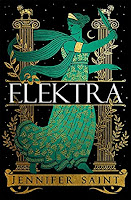Book Review: Elektra by Jennifer Saint
 |
4.5⭐
For readers who are familiar with the Classics and/or enjoy the plethora of retellings revolving around the Trojan War, it should not surprise you that there is not much about the Trojan War itself in the retellings that will strike you as completely new. But the beauty of Jennifer Saint’s Elektra lies in how the author chooses to highlight the perspectives of the women from these stories as told from their different vantage points. In Elektra, the author focuses on the “tainted” bloodline of the cursed House of Atreus and three women whose “fates inextricably tied to this curse, and the fickle nature of men and gods”. Our narrators are not on the battlefield and they don’t share the same loyalties or motivations - but Cassandra, Clytemnestra and Elektra are three women whose lives and destinies are irrevocably impacted by the events preceding, during and after the fall of Troy.
Cassandra, daughter of King Priam of Troy and Hecabe , blessed with prophetic vision that nobody believes, her warnings and pleas fall on deaf ears as Troy falls.
“Every word I speak is unwelcome. My throat is raw from the words that are torn from me when I touch someone, when I look into their eyes and see the blinding white truth. My prophecies rip out my insides, but still they come, unbidden, even as I quake at the consequences.”
Clytemnestra, wife of Agamemnon, King of Mycenae of the House of Atreus, mother of Iphigenia, Elektra and Orestes. Her rage resulting from Agamemnon’s sacrifice of her firstborn daughter Iphigenia in Aulis before the Trojan War wreaks havoc in Mycenae and the cursed House of Atreus
“In the light of the rising sun, I prayed that my husband would survive this war and come home safe to me. I wanted no Trojan soldier to take what was mine; no glory-seeking warrior to seize his chance of fame by plunging his sword into Agamemnon’s heart Let him come back, I hissed into the empty sky. Let him come back so that I can see his eyes as the light drains from them. Let him come back and die at the hands of his bitterest enemy. Let him come back so that I can watch him suffer. And let me make it slow.”
Elektra, daughter of Agamemnon and Clytemnestra, unflinching in her loyalty to her father chooses to justify his actions as the will of the Gods and will do anything to exact revenge on those who were responsible for her father’s demise.
“ I have always wanted to grow up to be the woman he thought I would become, the woman I could have been, if only he had been able to stay. To live up to the name he gave me.”
A major part of the narrative is shared between Elektra, Cassandra and Clytemnestra- each of whom gives us a brief picture of the significant events that impact their lives before, during and after the fall of Troy. Only after almost ¾ of the novel does Elektra’s voice become stronger in the narrative. There is a lot packed into the novel without it becoming too tedious. There is a certain amount of repetition but given that each of the narrators tells the story from different vantage points, nowhere did I lose interest. Cassandra’s narrative was heartbreaking as was Clytemnestra’s agony in witnessing Iphigenia’s death. The author is brilliant in her portrayal of the strong emotions and complexities in these women- Clytemnestra’s rage and agony, Cassandra’s innocence, despair and frustration and Elektra’s loyalty, anger and desire for revenge. The scenes between Cassandra and Clytemnestra were stunning in their emotional depth despite rarely anything being said between the two. The complicated mother-daughter relationship between Clytemnestra and Elektra, each obsessed with their respective quest for revenge, was brilliantly penned. Elektra does not come across as very likable but I think hers was probably the most complicated character to develop, a task that the author does expertly. Many of her actions and motivations might not feel justified but she is her father’s daughter and is unapologetic in her quest to avenge her father’s death and willing to sacrifice and bear the consequences of her actions.
Author Jennifer Saint masterfully weaves the multiple PoVs together with elegant prose and superb characterizations in a well-paced and intense narrative. While I enjoyed Jennifer Saint’s Ariadne, which I thought was an impressive debut, I found Elektra to be a more powerful and absorbing novel. I would not hesitate to recommend this to those with a fondness for feminist retellings of stories from the Greek myths. I thoroughly enjoyed this novel and eagerly look forward to more from this author in the future.
Comments
Post a Comment